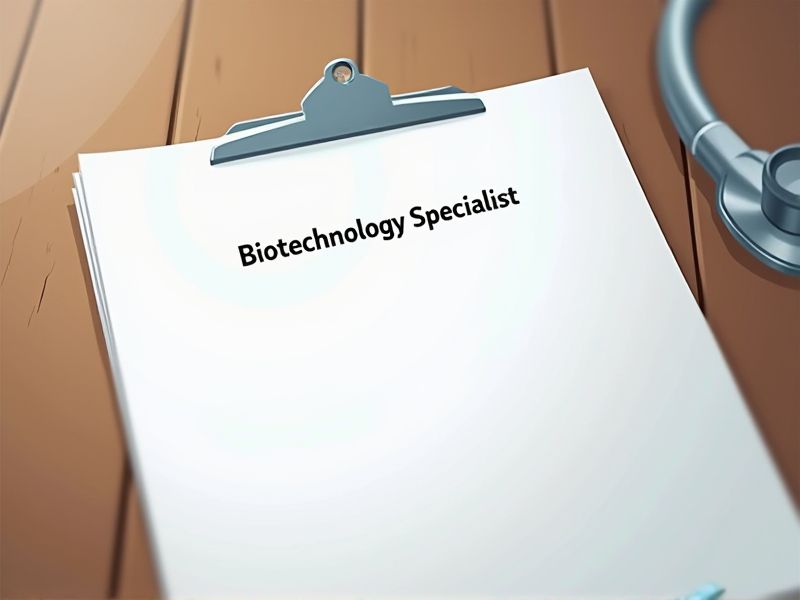
A Biotechnology Specialist often deals with complex scientific processes and technologies that require a deep understanding of both biological and technical principles. Certifications act as a formal validation of expertise, ensuring specialists can safely and effectively operate within regulated environments. They also facilitate compliance with industry standards and boost credibility in multidisciplinary teams. Important certifications can enhance career prospects and provide a competitive edge in this rapidly evolving field.
Certified Biotechnology Professional (CBP)
The Certified Biotechnology Professional (CBP) designation establishes a standardized benchmark of knowledge and expertise in biotechnology, which is crucial for ensuring consistent competency among specialists. As the biotechnology field rapidly evolves with advancements in research and technology, professionals need the CBP to stay updated with the latest industry standards and practices. The certification also enhances credibility and trustworthiness, making specialists more attractive to employers who seek qualified and knowledgeable personnel. Holding a CBP can lead to increased career opportunities and professional growth due to the recognized validation of skills and knowledge in the competitive biotechnology sector.
Clinical Research Professional Certification (CCRP)
Acquiring a Clinical Research Professional Certification (CCRP) enhances a biotechnology specialist's credibility in handling clinical trials, directly affecting the trust and confidence stakeholders place in their skills. This certification ensures a comprehensive understanding of regulatory guidelines, which influences the successful execution of research compliant with legal standards. Knowledge gained from CCRP aids biotechnology specialists in maintaining the integrity of data, impacting the accuracy and reliability of research outcomes. Trained specialists can effectively mitigate risks and manage complex research processes, ensuring the smooth progression and completion of clinical studies.
Good Laboratory Practices (GLP) Certification
Receiving Good Laboratory Practices (GLP) Certification ensures biotechnology specialists adhere to standards that maintain the integrity and reliability of their experimental data. Certification provides assurance to regulators and stakeholders that research is conducted systematically, minimizing errors that could affect results. By following GLP, specialists improve the reproducibility of studies, which is crucial for scientific validation and peer acceptance. Compliance with GLP enables the seamless transition from research to application by satisfying regulatory requirements needed for product approvals.
Good Manufacturing Practices (GMP) Certification
GMP certification ensures biotechnology specialists adhere to standardized safety and quality protocols, minimizing the risk of product contamination and ensuring consumer safety. It provides a regulatory framework, enhancing product consistency and reliability in pharmaceutical applications. Compliance with GMP certification improves the market credibility and trustworthiness of biotechnology companies, facilitating international trade. Regulatory authorities often require GMP certification for product approval, influencing a specialist's capacity to innovate and commercialize new biotechnological solutions.
Regulatory Affairs Certification (RAC)
Regulatory Affairs Certification (RAC) serves as a validation of a Biotechnology Specialist's mastery over regulatory knowledge, enhancing their professional credibility. With the biotechnology industry governed by strict regulations, RAC ensures that professionals are equipped to navigate complex legal landscapes, reducing the risk of non-compliance. Employers value this certification as it demonstrates a commitment to maintaining rigorous standards, often leading to increased career opportunities and responsibilities. Additionally, RAC certification empowers specialists to contribute effectively to the development and approval processes, facilitating faster time-to-market for biotechnological innovations.
Quality Management Systems (ISO 9001 Lead Auditor) Certification
Implementing a Quality Management System (QMS) through ISO 9001 certification ensures that a Biotechnology Specialist can consistently meet customer and regulatory requirements, enhancing trust and reliability in their products. The certification provides a structured framework for continuous improvement, essential in the biotechnology industry where innovation and precision are critical. Holding a Lead Auditor certification amplifies a specialist's ability to conduct internal audits, identify process inefficiencies, and facilitate corrective actions, improving overall operational effectiveness. In a competitive market, ISO 9001 certification offers a significant advantage by validating a specialist's commitment to maintaining high-quality standards and operational excellence.
Bioinformatics Certification
A Bioinformatics Certification equips a Biotechnology Specialist with computational tools to analyze complex biological data. Mastery in bioinformatics techniques can enhance precision in genetic research, leading to more effective biotechnological applications. The certification often provides industry-recognized credentials, increasing professional credibility. As biotechnology increasingly integrates digital technologies, proficiency in bioinformatics becomes essential for career advancement.
Molecular Biology Certification
A Molecular Biology Certification enhances a biotechnology specialist's understanding of the intricate processes at the cellular level, enabling them to develop more precise and effective solutions. This certification signifies a recognized level of expertise, increasing a professional's credibility in the field and potentially leading to career advancement opportunities. It equips specialists with the latest techniques and methodologies used in molecular biology, ensuring they stay updated with current scientific advancements. In many biotechnology sectors, possessing such a certification is often a requirement, underscoring its importance for compliance and quality assurance in research and development projects.
Project Management Professional (PMP) Certification
The PMP certification instills crucial project management skills, enabling biotechnology specialists to effectively manage complex research initiatives within established timelines and budgets. Employers in the biotechnology sector often seek professionals with PMP certification as it demonstrates a formalized approach to strategic planning and execution, reducing project failures. For biotechnology specialists, PMP certification enhances collaboration across interdisciplinary teams, fostering more efficient communication and coordination. The competitive edge gained from a PMP certification can lead to higher career advancement opportunities and salary prospects within the biotechnology field.
Laboratory Safety Certification (OSHA Training)
Laboratory safety certification, like OSHA training, reduces the risk of accidents by equipping biotechnology specialists with crucial knowledge of hazardous materials and safety protocols. Understanding and adhering to safety guidelines increases the credibility and professionalism of an individual working in sensitive and potentially risky environments. Having certified staff can lower organizational liability and insurance costs because it demonstrates a commitment to compliance with legal safety standards. Improved safety practices contribute to a more productive work environment, minimizing interruptions caused by accidents or safety violations.
Summary
As you obtain certifications as a Biotechnology Specialist, your professional credibility can enhance significantly. This recognition can lead to better job prospects and potentially higher salaries. Employers often prefer certified specialists as they demonstrate a commitment to professional development. Consequently, your career trajectory in biotechnology could become more dynamic and rewarding.
